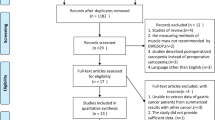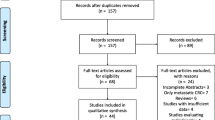Abstract
Background
This meta-analysis aimed to investigate the value of preoperative sarcopenia in predicting complications after esophagectomy. Clinicopathologic characteristics of sarcopenia patients, which may support sarcopenia management, also were studied.
Methods
This study searched for articles describing an association between sarcopenia and short-term outcomes after esophagectomy using PubMed, EMBASE, and the Cochrane Library. Mantel–Haenszel and inverse variance models were used for the meta-analyses of end points.
Results
The meta-analysis included 14 studies comprising a total of 2387 patients. Sarcopenia was significantly associated with advanced age (weighted mean difference [WMD], 3.48; 95% confidence interval [CI], 2.22–4.74), lower body mass index (WMD − 2.22; 95% CI − 2.65 to − 1.79), squamous cell carcinoma (odds ratio [OR], 2.78; 95% CI 1.72–4.47), advanced clinical tumor stage (OR 1.65; 95% CI 1.28–2.15), and neoadjuvant therapy (OR 1.87; 95% CI 1.38–2.53). The sarcopenia patients showed lower preoperative albumin levels (WMD − 0.11; 95% CI − 0.19 to − 0.04) than the nonsarcopenia patients. Sarcopenia was significantly predictive of pneumonia (OR 2.58; 95% CI 1.75–3.81) and overall complications (OR 1.52; 95% CI 1.07–2.15) after esophagectomy. The sarcopenia patients also showed nonsignificant increases in the risks of anastomotic leakage (OR 1.29; 95% CI 0.99–1.67), vocal cord palsy (OR 2.03; 95% CI 0.89–4.64), and major complications (≥ Clavien-Dindo grade III; OR 1.30; 95% CI 0.95–1.79) but not increased operation time, blood loss, or mortality.
Conclusions
Preoperative sarcopenia assessment showed considerable potential for predicting postoperative complications for esophageal cancer patients. To realize this potential, more effective diagnostic criteria and severity classifications for sarcopenia are warranted.




Similar content being viewed by others
References
Cruz-Jentoft AJ, Baeyens JP, Bauer JM, et al. Sarcopenia: European consensus on definition and diagnosis: report of the European Working Group on Sarcopenia in Older People. Age Ageing. 2010;39:412–23. https://doi.org/10.1093/ageing/afq034.
Muscaritoli M, Anker SD, Argiles J, et al. Consensus definition of sarcopenia, cachexia, and pre-cachexia: joint document elaborated by Special Interest Groups (SIG) “cachexia-anorexia in chronic wasting diseases” and “nutrition in geriatrics.” Clin Nutr. 2010;29:154–9. https://doi.org/10.1016/j.clnu.2009.12.004.
Oguma J, Ozawa S, Kazuno A, Yamamoto M, Ninomiya Y, Yatabe K. Prognostic significance of sarcopenia in patients undergoing esophagectomy for superficial esophageal squamous cell carcinoma. Dis Esophagus. 2019;32(7). https://doi.org/10.1093/dote/doy104.
Jarvinen T, Ilonen I, Kauppi J, Salo J, Rasanen J. Loss of skeletal muscle mass during neoadjuvant treatments correlates with worse prognosis in esophageal cancer: a retrospective cohort study. World J Surg Oncol. 2018;16:27. https://doi.org/10.1186/s12957-018-1327-4.
Nakashima Y, Saeki H, Nakanishi R, et al. Assessment of sarcopenia as a predictor of poor outcomes after esophagectomy in elderly patients with esophageal cancer. Ann Surg. 2018;267:1100–4. https://doi.org/10.1097/SLA.0000000000002252.
Saeki H, Nakashima Y, Kudou K, et al. Neoadjuvant chemoradiotherapy for patients with cT3/nearly T4 esophageal cancer: is sarcopenia correlated with postoperative complications and prognosis? World J Surg. 2018;42:2894–901. https://doi.org/10.1007/s00268-018-4554-5.
Siegal SR, Dolan JP, Dewey EN, et al. Sarcopenia is not associated with morbidity, mortality, or recurrence after esophagectomy for cancer. Am J Surg. 2018;215:813–7. https://doi.org/10.1016/j.amjsurg.2017.12.017.
Soma D, Kawamura YI, Yamashita S, et al. Sarcopenia, the depletion of muscle mass, an independent predictor of respiratory complications after oncological esophagectomy. Dis Esophagus. 2018;32(3). https://doi.org/10.1093/dote/doy092.
Elliott JA, Doyle SL, Murphy CF, et al. Sarcopenia: prevalence, and impact on operative and oncologic outcomes in the multimodal management of locally advanced esophageal cancer. Ann Surg. 2017;266:822–30. https://doi.org/10.1097/SLA.0000000000002398.
Nishigori T, Okabe H, Tanaka E, Tsunoda S, Hisamori S, Sakai Y. Sarcopenia as a predictor of pulmonary complications after esophagectomy for thoracic esophageal cancer. J Surg Oncol. 2016;113:678–84. https://doi.org/10.1002/jso.24214.
Grotenhuis BA, Shapiro J, van Adrichem S, et al. Sarcopenia/muscle mass is not a prognostic factor for short- and long-term outcome after esophagectomy for cancer. World J Surg. 2016;40:2698–704. https://doi.org/10.1007/s00268-016-3603-1.
Harada K, Ida S, Baba Y, et al. Prognostic and clinical impact of sarcopenia in esophageal squamous cell carcinoma. Dis Esophagus. 2016;29:627–33. https://doi.org/10.1111/dote.12381.
Paireder M, Asari R, Kristo I, et al. Impact of sarcopenia on outcome in patients with esophageal resection following neoadjuvant chemotherapy for esophageal cancer. Eur J Surg Oncol. 2016;43:478–84. https://doi.org/10.1016/j.ejso.2016.11.015.
Makiura D, Ono R, Inoue J, et al. Preoperative sarcopenia is a predictor of postoperative pulmonary complications in esophageal cancer following esophagectomy: a retrospective cohort study. J Geriatr Oncol. 2016;7:430–6. https://doi.org/10.1016/j.jgo.2016.07.003.
Ida S, Watanabe M, Yoshida N, et al. Sarcopenia is a predictor of postoperative respiratory complications in patients with esophageal cancer. Ann Surg Oncol. 2015;22:4432–7. https://doi.org/10.1245/s10434-015-4559-3).
Sato S, Nagai E, Taki Y, et al. Hand grip strength as a predictor of postoperative complications in esophageal cancer patients undergoing esophagectomy. Esophagus. 2017;15:10–18. https://doi.org/10.1007/s10388-017-0587-3.
Springer J, Springer JI, Anker SD. Muscle wasting and sarcopenia in heart failure and beyond: update 2017. ESC Heart Fail. 2017;4:492–8. https://doi.org/10.1002/ehf2.12237.
Martin L, Birdsell L, Macdonald N, et al. Cancer cachexia in the age of obesity: skeletal muscle depletion is a powerful prognostic factor, independent of body mass index. J Clin Oncol. 2013;31:1539–47. https://doi.org/10.1200/jco.2012.45.2722.
Boshier PR, Heneghan R, Markar SR, Baracos VE, Low DE. Assessment of body composition and sarcopenia in patients with esophageal cancer: a systematic review and meta-analysis. Dis Esophagus. 2018;31(8). https://doi.org/10.1093/dote/doy047.
Low DE, Alderson D, Cecconello I, et al. International consensus on standardization of data collection for complications associated with esophagectomy: Esophagectomy Complications Consensus Group (ECCG). Ann Surg. 2015;262:286–94. https://doi.org/10.1097/SLA.0000000000001098.
Luo D, Wan X, Liu J, Tong T. Optimally estimating the sample mean from the sample size, median, mid-range, and/or mid-quartile range. Stat Methods Med Res. 2018;27:1785–805. https://doi.org/10.1177/0962280216669183.
Wan X, Wang W, Liu J, Tong T. Estimating the sample mean and standard deviation from the sample size, median, range and/or interquartile range. BMC Med Res Methodol. 2014;14:135. https://doi.org/10.1186/1471-2288-14-135.
Prado CM, Lieffers JR, McCargar LJ, et al. Prevalence and clinical implications of sarcopenic obesity in patients with solid tumours of the respiratory and gastrointestinal tracts: a population-based study. Lancet Oncol. 2008;9:629–35. https://doi.org/10.1016/S1470-2045(08)70153-0.
Chen LK, Liu LK, Woo J, et al. Sarcopenia in Asia: consensus report of the Asian Working Group for Sarcopenia. J Am Med Dir Assoc. 2014;15:95–101. https://doi.org/10.1016/j.jamda.2013.11.025.
Schols AM, Broekhuizen R, Weling-Scheepers CA, Wouters EF. Body composition and mortality in chronic obstructive pulmonary disease. Am J Clin Nutr. 2005;82:53–9. https://doi.org/10.1093/ajcn.82.1.53.
Wang P, Li Y, Sun H, et al. Predictive value of body mass index for short-term outcomes of patients with esophageal cancer after esophagectomy: a meta-analysis. Ann Surg Oncol. 2019;26:2090–103. https://doi.org/10.1245/s10434-019-07331-w.
Yassaie SS, Keane C, French SJH, Al-Herz FAJ, Young MK, Gordon AC. Decreased total psoas muscle area after neoadjuvant therapy is a predictor of increased mortality in patients undergoing oesophageal cancer resection. ANZ J Surg. 2019;89:515–9. https://doi.org/10.1111/ans.15106.
Zhang Y. Epidemiology of esophageal cancer. World J Gastroenterol. 2013;19:5598–606. https://doi.org/10.3748/wjg.v19.i34.5598.
Acknowledgment
This work was funded by the Medical and Health Technology Innovation Project of the Chinese Academy of Medical Sciences (Grant No. 2018-12M-3-003) (Spatial–Temporal Mapping Analysis on Chinese Cancer Burden).
Author information
Authors and Affiliations
Corresponding author
Ethics declarations
Disclosure
There are no conflicts of interest.
Additional information
Publisher's Note
Springer Nature remains neutral with regard to jurisdictional claims in published maps and institutional affiliations.
Electronic supplementary material
Below is the link to the electronic supplementary material.
Rights and permissions
About this article
Cite this article
Wang, Py., Xu, Ld., Chen, Xk. et al. Sarcopenia and Short-Term Outcomes After Esophagectomy: A Meta-analysis. Ann Surg Oncol 27, 3041–3051 (2020). https://doi.org/10.1245/s10434-020-08236-9
Received:
Published:
Issue Date:
DOI: https://doi.org/10.1245/s10434-020-08236-9




